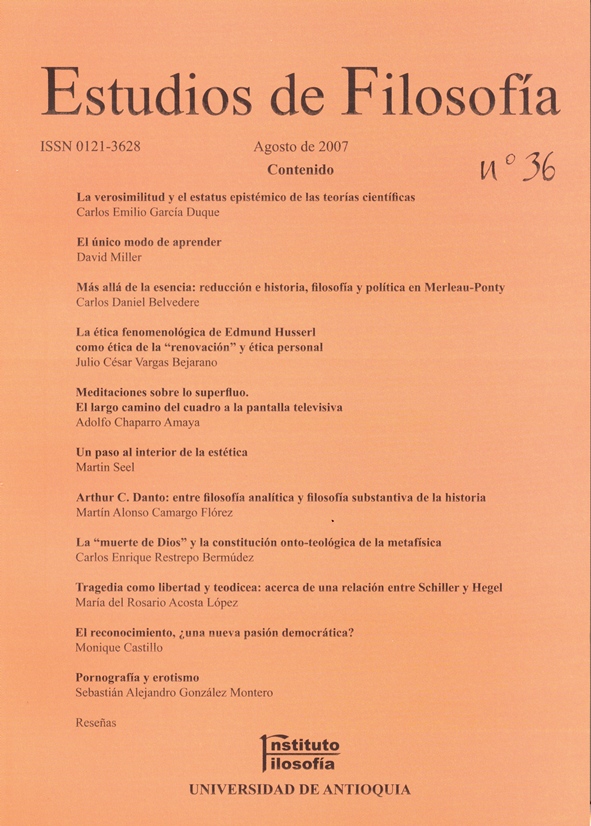Beyond essce: reduction and history, philosophy and politics in Merleau-Ponty
DOI:
https://doi.org/10.17533/udea.ef.12737Keywords:
phenomenology, history, essence, politicsAbstract
While discussing a letter from Husserl to Lévy Brühl, Merleau-Ponty states that the eidetic of history does not deliver us from historical investigation. This conception has always been present in his work, and it has been modeled in different ways and composing combinations along his phenomenology, his philosophy of history, and his ontology. In each one of those stages he displays, respectively, a situationist, a structuralist, and a sensible conception of the essence. However, the exceedence of the lived respect to the thought things does not have to be interpreted as a defeat of the thought but as creation.
Downloads
References
HUSSERL, E. Carta a Lucien Lévy-Brühl. Sociológica. Revista Argentina de Ciencias Sociales, Buenos Aires, vol. 2/3, 1979, pp. 26-32.
MERLEAU-PONTY, M. Fenomenología de la percepción. Planeta-De Agostini, Barcelona, 1985.
____________. Humanismo y terror. Leviatán, Buenos Aires, 1986.
____________. La fenomenología y las ciencias del hombre. Nova, Buenos Aires, 1964.
____________. Las aventuras de la dialéctica. La Pléyade, Buenos Aires, 1974.
____________. Lo visible y lo invisible. Seix Barral, Barcelona, 1970.
____________. Notes de cours sur L’origine de la géométrie de Husserl. PUF, Paris, 1998.
____________. Parcours. 1935-1961. Verdier, Lagrasse, 1997.
____________. Sentido y sinsentido. Península, Barcelona, 1977.
____________. Signos. Seix Barral, Barcelona, 1964.
Downloads
Published
How to Cite
License
Copyright (c) 2007 Carlos Daniel Belvedere

This work is licensed under a Creative Commons Attribution-NonCommercial-ShareAlike 4.0 International License.
Authors who publish with this journal agree to the following terms:
1. The Author retains copyright in the Work, where the term "Work" shall include all digital objects that may result in subsequent electronic publication or distribution.
2. Upon acceptance of the Work, the author shall grant to the Publisher the right of first publication of the Work.
3. The Author shall grant to the Publisher a nonexclusive perpetual right and license to publish, archive, and make accessible the Work in whole or in part in all forms of media now or hereafter known under a Creative Commons Attribution-NoCommercia-ShareAlike (CC BY-NC-SA 4.0), or its equivalent, which, for the avoidance of doubt, allows others to copy, distribute, and transmit the Work under the following conditions: (a) Attribution: Other users must attribute the Work in the manner specified by the author as indicated on the journal Web site;(b) Noncommercial: Other users (including Publisher) may not use this Work for commercial purposes;
4. The Author is able to enter into separate, additional contractual arrangements for the nonexclusive distribution of the journal's published version of the Work (e.g., post it to an institutional repository or publish it in a book), as long as there is provided in the document an acknowledgement of its initial publication in this journal;
5. Authors are permitted, and Estudios de Filosofía promotes, to post online the preprint manuscript of the Work in institutional repositories or on their Websites prior to and during the submission process, as it can lead to productive exchanges, as well as earlier and greater citation of published work (see The Effect of Open Access). Any such posting made before acceptance and publication of the Work is expected be updated upon publication to include a reference to the Estudios de Filosofía's assigned URL to the Article and its final published version in Estudios de Filosofía.















